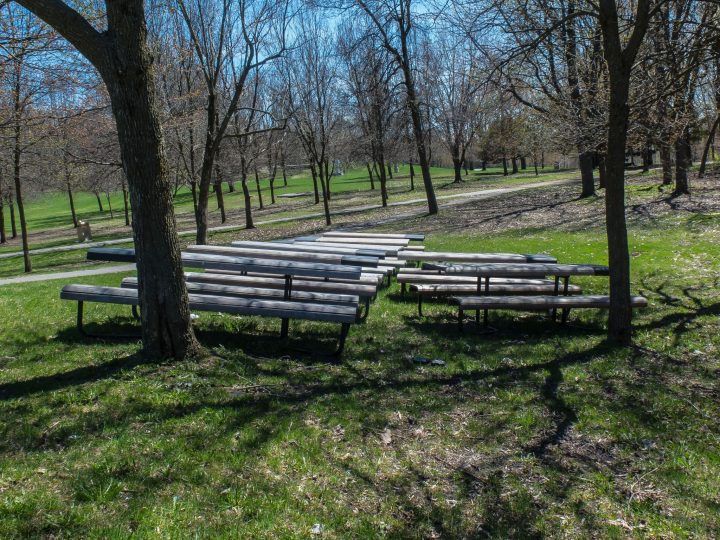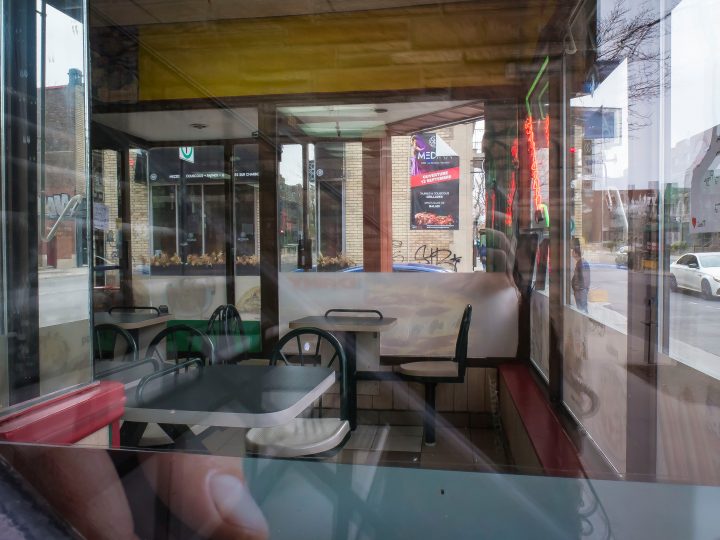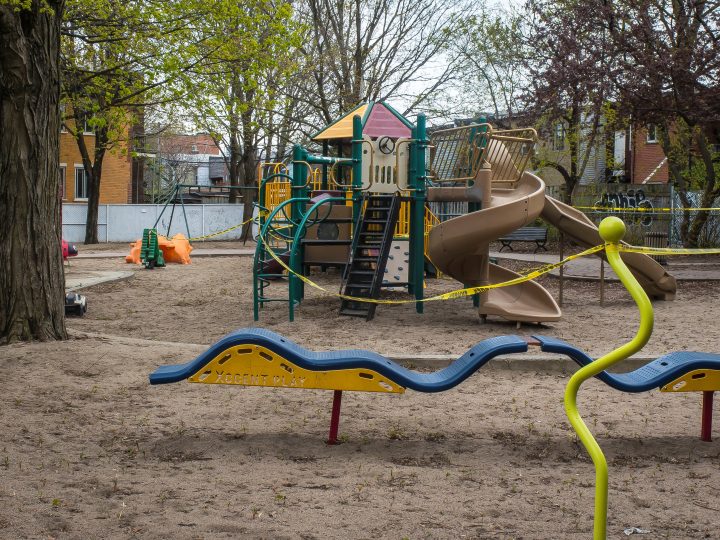At first, around March 14, I figure I can handle it. I survived a shooting at the college where I teach. This is nothing. A two-week pandemic-engendered confinement is a walk in the park. Easy-peasy. In the metro that day I feel bold and even brave; still, I wrap my wool scarf tightly around my nose and mouth. I’m not sure now what I or anyone else thought those two weeks would accomplish; I simply held on to the hope the confinement would be limited and spent the rest of those weeks at home, relaxing, taking long walks, cooking, and sleeping well. But then the lockdown is extended, and the bargaining begins.
For the next month and a half, I acquire a sort of survivalist mentality. People around me are hoarding toilet paper, meat, and hand sanitizer, and I am startled awake by the empty shelves in supermarkets. I quickly figure out that there’s enough toilet paper to go around if you shop at small grocery stores, and I begin eating fish because no one else seems to; only the meat shelves are bare: no one loves the humble sardine. I trust that soap works just as well as hand sanitizer. I am fine.
Yet the moment I tell myself this, doubt creeps in and soon enough, out of superstition, I line up for twenty minutes outside my local pharmacy to gather the last bottles of rubbing alcohol. What if I am not fine after all and my sense of security was really ignorance or arrogance? Later, I discover that if I mix rubbing alcohol with the small amount of hand sanitizer I have left at home and shake the bottle vigorously, the alcohol and disinfectant content is increased, but the sanitizing gel retains its pleasant thickness. I am of European stock, and the canniness of my ancestors as they survived plague, typhus, and influenza pandemics of their own, not to mention an economic depression and two world wars, is shaken loose from my DNA, rises to the surface, and takes over.
Next, I go online and lose my mind. I order nitrile gloves and masks, all manner of masks: the black ones made out of foam that the youth of Hong Kong wore as they defied the Chinese-backed authorities, disposable turquoise and pink masks that take a month to arrive from China and come with instructions in Mandarin, and washable hand-sewn ones made out of psychedelic 1960s fabrics.
When I learn that this virus is essentially a microscopic ball of lipids defeated by soap, I foresee a shortage of liquid soap and line up again at the pharmacy to buy the last bottles. Then I order packets of printing paper and boxes of toner cartridges because I now teach online and will soon be without.
But I am not a selfish hoarder: I divvy up the loot between my 88-year-old mother and my friends. I feel like Bluebeard’s wife, who pretends to pray to keep her murderous husband at bay as she waits for the cavalry to arrive. If I have enough, I think, enough of everything we need to hold on until a vaccine is developed and tested, I will be all right and so will those I love. I acquire the instincts of a squirrel, the slyness of a raccoon. I become animal-like in my anxiety. My will to live is very strong: I can feel it. I will outlast this virus. Though physically frail, I am a warrior in spirit, I keep telling myself.
After a while, I become irascible for no apparent reason although soon enough the reasons begin to appear. On a pre-molar, a bit of filling cracks and falls away. When I call the dentist, hoping for reassurance and advice, the receptionist takes a week and a half to call me back and announces dismissively that she’d forgotten about my call and, anyway, they no longer do “that kind of work.” Medical appointments are also cancelled. I am confused. Aren’t doctors and dentists supposed to help?
When the Québec government suggests that teachers and students might return to school by May 4, I envision my classes, normally packed like poultry farms with forty students each, in a closed building where the air is constantly being recycled. Suddenly, I can hardly breathe. How dare these people, these politicians who can’t pronounce the word “epidemiology,” now think of putting students and teachers in danger while medical professionals who took the Hippocratic Oath are protected from contagion?
When the same government prepares to send health science teachers and then any kind of college teacher into infected long-term-care facilities because public servants are seemingly expendable, and a professor of history or sociology should be able to accomplish the same tasks as an experienced orderly, I explode into bursts of unrelated frustration. Denial is back, holding anger by the hand: why do we need another virtual meeting? Why is Zoom, which many of us use to teach online, vulnerable to hackers and trolls? Why is there no sense of security anywhere? Why do we keep getting so many impossibly long and contradictory memos?
Intellectually, I get it, of course: this is relatively new and somewhat unchartered territory. Still, I feel picked on, so I develop an exasperating itch and scratch my thigh obsessively, but there is no rash. Then one eye becomes inflamed from the weeks spent online teaching. Why can’t they all leave me alone! I was doing so well on my own. I was outsmarting the virus. I am in a state of revolt. I wonder if I have it in me to disobey government orders, and if I will be able to risk standing up for myself and losing my job. Around me, colleagues seethe with anger too but say very little, and because I do, because I am outspoken, I fear I may seem insane and unheroic.
The government uses wartime rhetoric: we are “at war” with a virus, people are being “redeployed” and are going “to the front,” so we must make sacrifices. We are all scattered, working from home, divided, and it occurs to me that it is now easier to conquer us. But as the number of hospitalizations and deaths spike, the government backs down on these half-baked plans to redeploy teachers, and actual soldiers descend upon long-term-care facilities and help along with medical specialists. I experience this as a reprieve from tension, but am puzzled that even the government hadn’t quite understood how far we had strayed from peace.
As Québec is identified in The Guardian as the seventh deadliest place in the world on May 13, I finally get that I fear death after all. Also, I can fight only one “enemy” at a time, and this virus, which no scientist seems to comprehend fully as it causes respiratory and organ failure, severe vascular inflammation, and strokes, is enemy enough.
I learn about my odds: I am somewhat at risk by virtue of my age and because my lungs are weak, but I had a BCG vaccine against tuberculosis as a child, which a handful of scientists now conjecture may provide some form of mysterious boost against this virus. My blood pressure is optimally low. I am a woman, and women’s immune systems tend to be stronger. My asthma is normally under control. But both my grandmother and father suffered severe strokes, and type A blood flows through my veins; they say those are the ones who struggle most with this virus. The bargaining returns—perhaps if I can read enough scientific articles that tip the balance towards my staying alive and steady, I can survive this. What I really want is a crystal ball.
When the confinement is prolonged to May 25, the vivid dreams begin. In one of them, a recurrent nightmare, I know I need to wear a mask; I know it. But something always stands in my way and prevents me from grasping one. The dream repeats itself on a loop: every time I reach for a mask, the dream starts anew with a different obstacle this time, but the pattern is the same.
I wake up one morning with Macbeth’s line trotting through my head like a horse round a manège: “full of scorpions is my mind,” Macbeth says. I wash and wash my hands till my knuckles go dry and begin to crack. I return to the pharmacy for hand cream even if they now say that moist skin attracts viruses. When will this mad washing ever be enough? Will I one day return to a time when I felt carefree enough to rub my nose casually with a dirty finger, like a child?
Then there is the dream where I inherit a house from a stranger. I get his furniture as well and am discouraged to see that, predictably, there are beds in all three bedrooms. They are dull, institutional beds. What will I do with so many ugly beds, I think to myself. What a white elephant this house is! It does not resemble me. It is cold, angular, desperately sterile. Or is this what I have become? An exterior garage, painted black, blocks the view of the river that flows by the house. It occurs to me later that this is imagery suggestive of death: hospital beds, deathbeds, morgue gurneys, and the black garage, like a funeral parlour overlooking the river Styx.
One night, I dream that an Englishwoman in her sixties marries an Englishman near his seventies. They are beautiful together, regal and tall, dressed in tweedy outfits from between the wars. At some point she pauses and wonders out loud why she needs to be married at her age. The man touches the inside of her forearm with such a gentle sensuality that I wake up into the emptiness that is my own life. It is four in the morning, as the song goes, and I can no longer sleep, so I go out on my back porch wrapped in a heavy wool cardigan and cradling a mug of ice-cold tap water, and I hear the honking of geese. When I look up, I see two of them flying westward against the rose-tinted sky; they fly so low that I see the markings on their necks and cheeks. What geese fly west in the Spring? Their flock flew by a few days earlier—this pair is late. Are they lost? I begin to cry. Evidently, I am lost.
When I go back to bed, I remember a man whose forty-fifth birthday party I attended when I was twenty-nine. I had brought him a pomegranate as a gift. He was a professor of Philosophy from Georgia, a Vietnam draft-dodger who spoke with the faintest southern drawl, and his eyes were light blue like those of a grizzling wolf. I was working nights in a Westmount typography, and he had encouraged me to return to university. When we’d danced that night, he had said that love is mean as he’d brushed my hair away from my face. Why had I brought him a pomegranate? Lines from the Song of Songs rap lightly at the door of my recall: “Let us get up early to the vineyards; let us see whether the vine has budded, whether the vine-blossom be opened, and the pomegranates be in flower; there I will give thee my love.”
As I lie down on top of the covers in the chilly darkness of my virus-laden despair, I suddenly wonder what he’d meant by “love is mean” when he had been kinder to me than almost anyone I had met until then. His best friend was the man I loved; perhaps he had meant that he would go after my heart even if he would hurt his friend. The last time I saw him, he had gotten drunk and caused a scene because I hadn’t left my boyfriend for him even though he had proposed to me three times. As we stood up to leave because the evening had turned unpleasant, he had reached out to me and apologized as my mate tugged at my hand and I’d followed, teetering on my high heels, awkward in my dress.
I never saw him again; I had made my choice. He died a few months later what still seems to me a tragic, untimely death. Did I make the wrong choice? Did I choose the wrong man? Could I have kept him alive if I’d agreed to marry him? Could some tiny occurrence in the chain of events ordered by fate have been altered? It occurs to me that in a few weeks or months I might contract, and die from, this virus, and I’m suddenly growing agitated as I convince myself that I picked the wrong man thirty years ago. My boyfriend never touched the inside of my forearm as tenderly as the older man did in my dream; instead, he’d spent decades insisting that his writing, his art, was at the centre of his life and no woman would ever claim that space. I chose the wrong man, the wrong goose. I may be at the end of my days, I think, and I screwed up my love life.
Depression deepens as, now and again, I come up for air in between bouts of self-pity and online teaching and take it all in: the hundreds of thousands of deaths around the world; all the elderly people who have died, confused and alone, perhaps wondering how or even why they lived decent lives, and now this; the local merchants who were already struggling with the abusive rent exacted by those lords who, in the twenty-first century, continue to lord the land, and who now see debt rising and dreams sinking further each day; the artists who have always struggled to survive and now are making art out of the anguish they nurse in the pit of their stomachs as they dream of being heard and paid again; those hundreds of thousands of people who lost their jobs and cannot feed themselves, let alone purchase masks or gloves, and must now ask for handouts while in allegedly civilized countries we throw away milk and slaughter pigs and chicks we can no longer sell.
When I think of all this, I feel the intranquillity and sway of the world’s sorrow, the immense, incalculable harm, the unfathomable private losses, and I cannot imagine how or when this is going to end. A colleague at work panics and tells anyone who will listen that we are going to go bankrupt. I dare not ask whom “we” might be. It is simply too much.
Each day, I go on a daily walk in my east-end neighbourhood where so few people listen to public-health directives that one might think there is no crisis. As I walk, I see the children’s drawings of rainbows taped to windows: Ça va bien aller, they announce, as their parents congregate defiantly in the alley, beer bottle in hand after work, at intimate distance from each other because apparently now is the ideal time to rebel against the Man when there were so many opportunities before. In a last flare-up of ire, I tape a rainbow to my own window: Ça va aller mieux quand vous mettrez des masques ! Then I take my sign down. Who am I to preach to those who feel perhaps that they need to be able to live a little while they are still alive? Soon enough, they will be denounced by an angry neighbour and the alley will fill up with police cars—this is what we’re like now as we learn to navigate the competing claims of collective impositions and individual freedoms or entitlement.
And this, too: unexpectedly, a colleague sends us an email advertising his new album. He teaches medieval literature, and he sings a beautiful dark song to an irresistible beat. I dance, alone, in my living room. In the Mile End on a Tuesday, Martha Wainwright sings on a roof to entertain a neighbourhood at a safe distance, like a luminous but slightly whacked-out angel poised between earth and sky. She invites three Hasidic men and a child to sing and they do so, sweetly, on that same roof. Is God listening?
Are you listening?
People hang out on their balconies or their front steps, lost for a moment in memories of a time when atomic pom-pom-like viruses didn’t lie in wait like a pack of hyenas at the edge of their hopes. It should have always been like this. Summer is almost here. I don’t know if my mother, my friends, or I will be alive by Fall. I never did, really, so I wonder what’s different now.
It is, simply, that our deaths have been scripted, and that is unbearable.
I cannot accept it.













